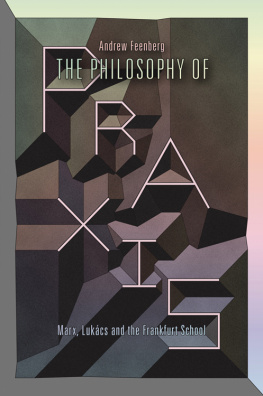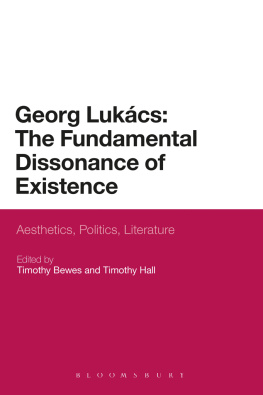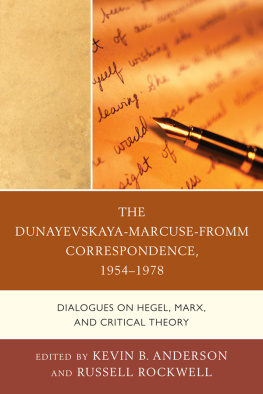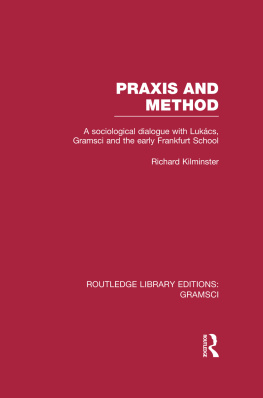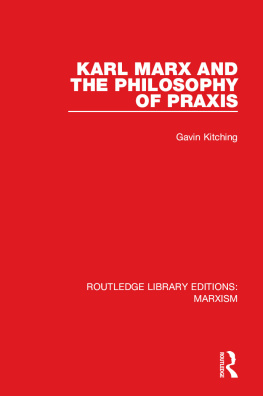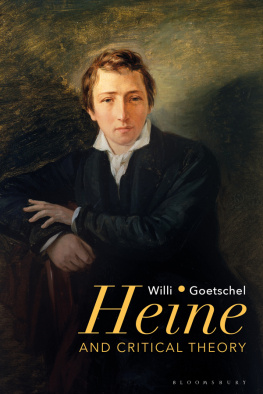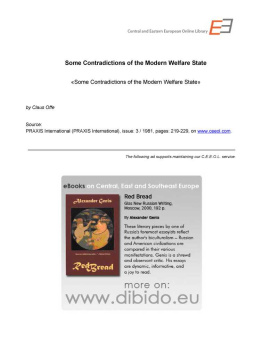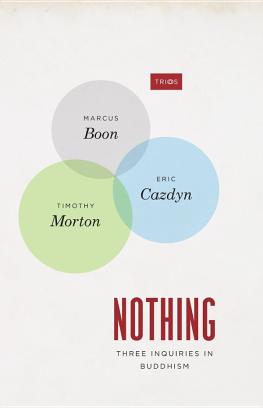The Philosophy of Praxis
MARX, LUKCS, AND THE FRANKFURT SCHOOL
Andrew Feenberg

This revised edition published by Verso 2014
Andrew Feenberg 2014
First published as Lukcs, Marx and the Sources of Critical Theory by Rowman and Littlefield 1981
All rights reserved
The moral rights of the author have been asserted
1 3 5 7 9 10 8 6 4 2
Verso
UK: 6 Meard Street, London W1F 0EG
US: 20 Jay Street, Suite 1010, Brooklyn, NY 11201
www.versobooks.com
Verso is the imprint of New Left Books
ISBN-13: 978-1-78168-172-5 (PBK)
ISBN-13: 978-1-78168-173-2 (HBK)
eISBN-13: 978-1-78168-219-7 (US)
eISBN-13: 978-1-78168-528-0 (UK)
British Library Cataloguing in Publication Data
A catalogue record for this book is available from the British Library.
Library of Congress Cataloging-in-Publication Data
Feenberg, Andrew.
[Lukcs, Marx, and the sources of critical theory]
The philosophy of praxis : Marx, Lukcs, and the Frankfurt School / Andrew Feenberg. New edition.
pages cm
First published as Lukcs, Marx and the Sources of Critical Theory, Rowman and Littlefield, copyright 1981, Oxford University Press, 1986.
Includes index.
ISBN 978-1-78168-172-5 (pbk. : alk. paper) ISBN 978-1-78168-173-2 (hardback : alk. paper) ISBN 978-1-78168-219-7 (ebook) ISBN 978-1-78168-528-0 (ebook)
1. Lukcs, Gyrgy, 18851971. 2. Marx, Karl, 18181883. 3. Frankfurt school of sociologyHistory. 4. Dialectical materialismHistory. 5. Critical theoryHistory. I. Title.
B4815.L84F43 2014
190dc23
2013041199
Typeset in Minion Pro by Hewer Text UK Ltd, Edinburgh, Scotland
Printed in the US by Maple Press
Contents
The rational foundations of modernity are in crisis. After World War II, the liberal and communist blocs each espoused a version of rationalistic universalism, based on Enlightenment values variously interpreted. These universalisms overshadowed ethnic, national, and religious differences, and as universal each claimed to be the true path. The final triumph of liberalism seemed to many to signal the end of history, the ultimate resolution of conflicting ideologies in a rational framework of rights and values served by science, technology, and administrative expertise. But instead a rising tide of particularisms has placed liberalism on the defensive. The universalistic claim has itself been reduced to a particular in this new context. It is under attack from two quarters, from fundamentalist religious ideology and from post-modern skepticism. The latter attack has no armies but it is effective in a different way, challenging overconfidence in science and progress in the advanced countries and among global elites, just as much of the developing world seems poised to modernize in imitation of the West.
In this context, what has Marxist philosophy to offer? Clearly, one cannot simply return to the thoroughly discredited positions of Soviet ideology, nor adopt a so-called orthodoxy based on the works of a nineteenth-century thinker of genius. Something fundamental has changed since 1989, not to mention 1847. But the question can be refined. Marxist thought is far from unified. In the period following World War I, a new interpretation of Marxism emerged in the West, enriched by the philosophy and sociology of the time. Throughout much of the last century this so-called Western Marxism played a significant role in philosophical debates. It has been eclipsed since the fall of the Soviet Union, but paradoxically so, since it elaborated some of the most trenchant criticisms of Soviet communism from an original Marxist standpoint. In this book I return to this tradition for a second look. I believe it has resources for addressing the crisis of rationality that have been overlooked. I hope to show this in the pages that follow.
This book is a thoroughly revised version of my first book, Lukcs, Marx and the Sources of Critical Theory. The original was published over thirty years ago in 1981. The book grew out of a doctoral dissertation on Lukcs prepared for Herbert Marcuse at the University of California, San Diego. In the original version I attempted to treat Lukcs not only as a major Marxist theorist but also as an important continental philosopher. In this revised version I still pursue the same goals, but I hope with more success.
The early Lukcs and the principal members of the Frankfurt SchoolHorkheimer, Adorno, and Marcuseare the major figures in Western Marxism. Marxs early Economic and Philosophical Manuscripts of 1844 were immediately adopted as a founding text of this tradition after their publication in 1932. I describe the underlying doctrine of this whole tradition as philosophy of praxis for reasons I explain in the first chapter. The essential claim of this philosophy is the significance of revolution, not just for political and social theory but for the ultimate questions of epistemology and ontology. The early Marx and Lukcs argue that the basic demands of reason that emerge from classical German philosophy are fulfilled not by speculation but by revolution. This is the famous realization of philosophy for which Marx calls for in his early writings, and most notably in the eleventh thesis on Feuerbach. of this new version of the book presents the argument in its most elaborate form in Lukcs. Soon after completing my thesis I was able to show a similar logic at work in Marxs Economic and Philosophical Manuscripts of 1844. Like Lukcs, Marx carries out a socially based metacritique of philosophy that I explain in the first two chapters.
The pivotal text of philosophy of praxis is History and Class Consciousness, published in 1923. The key to understanding this text is the concept of reification. With this concept Lukcs signified the limits of a modern culture based on the model of scientific-technical rationality. The usual technocratic understanding of modern society is reified in precisely Lukcss sense of the term. Bureaucratic administrations, markets, and technologies are all products of our scientific age; like science they are thought to be morally neutral tools beneficial to humanity as a whole when properly used.
But in reality these institutions are social products, shaped by social forces and shaping the behavior of their users. They more nearly resemble legislation than mathematics or science. Thus their claim to universality is flawed at its basis. Like legislation, they are either good or bad, never neutral. Lukcs argued that when societies become conscious of the social contingency of the rational institutions under which they live, they can then judge and change them. This implication of the theory of reification distinguishes society, including its technology, from the nature of natural science. Lukcs believed that a revolution from below would overthrow reification and create a socialist alternative to capitalist modernity. That revolution would not reject reason and its fruits but would reconfigure rational institutions in response to the needs of the oppressed.
The Frankfurt School applied the concept of reification in a very different time. Writing under the influence of the postWorld War I revolutions, Lukcs optimistically assumed that the working class would always retain an oppositional consciousness on the basis of the gap between its daily experience and needs and the rationalized economic and administrative forms imposed on it. Marcuses theory of the one-dimensional society is the culmination of the Frankfurt Schools critique of this optimistic assessment of revolutionary prospects. He recognized the extension of reification into the depths of social life. In advanced capitalism the working class is no longer even partially exempt as media propaganda and consumerism colonize everyday life and consciousness.

